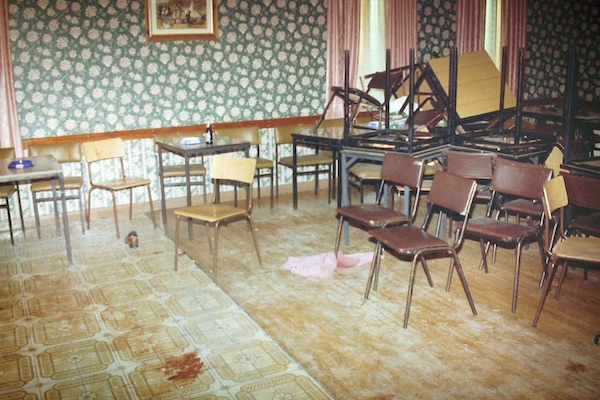
A Catholic priest who comforted the bereaved after the Greysteel massacre 25 years ago has said he believes the revulsion felt after the savage mass-murder helped move the North of Ireland towards peace.
“It was very true of Greysteel that those who suffered the most were quickest to forgive, to look for peace,” Fr Stephen Kearney said ahead of the 25th anniversary.
On October 30, 1993, loyalist gunmen entered the Rising Sun pub in the quiet, rural village in County Derry during a Halloween party and, with the words ‘trick or treat’, opened fire. At first, those inside believed the gunmen were playing a Halloween prank.
The shootings at the Rising Sun Bar claimed the lives of seven people, and another who died from his injuries six months later. Six of the deceased were Catholics, while two were Protestant.
The attack was claimed by a group styling itself ‘Ulster Freedom Fighters’, a cover name for the UDA. The attack was said to have been in revenge for an IRA attack which targeted a UDA meeting on the Shankill Road in Belfast days before.
It took place just before 10pm, when three gunmen - Stephen Irwin, Geoffrey Deeney and Torrens Knight - entered the busy pub. Irwin was armed with an automatic rifle, Deeney with a pistol, and Knight with a sawn-off shotgun.
The Czechoslovakian-made VZ-58 assault rifle used by Irwin was one of several hundred smuggled into the north with the help of UDA member Brian Nelson, who was working for the British Army’s Force Research Unit.
Knight was also widely alleged to have been an RUC Special Branch agent after it emerged he had been paid tens of thousands of pounds from an unidentified source. Unanswered questions remain about the role of collusion in the massacre.
Fr Kearney, who is now based in County Tyrone, told the Derry Journal of his memories of the aftermath of the shooting ahead of the 25th anniversary this week.
He said his colleague, the late Fr Jack Gallagher, had been the first person to enter the bar after the carnage.
“The place was lit up with the lights of cars,” he said. “The first person I saw coming out was Fr Jack Gallagher. I didn’t know how many were actually dead. We couldn’t have counted them.”
He recalled a “haze of grey dullness” hanging over the village in the immediate aftermath.
“I remember certain moments,” he said. “One was when I was standing outside the chapel the next morning. I hadn’t been to my bed until that morning. I was over for the nine o’clock Mass in the chapel and I saw a few people standing there.
“They were barely able to speak, in shock. It was a dry, cool autumn morning. If I could paint the picture I wouldn’t have to describe it - everybody seemed to be grey, everything seemed to be grey, everyone seemed to have been wearing grey clothes. Everything was in a haze of grey dullness.
“One of the people I saw was John Duddy whose wife had been killed.
“I had given her a lift home a few days before and she had arrived at my door with an apple tart as a reward for leaving her home. She was a lovely woman. They were there, a middle aged couple out for a drink that night, as were most of the people there. They were mostly older people.”
Asked how the community reacted to the terrible events that night, Fr Kearney said: “The people joined into their suffering. In the immediate aftermath there were some who found it hard to cope, who were saying things that wouldn’t have been normal for them to say, out of anger or hopelessness.
“But most were neither hating, nor angry, nor hopeless.”
But he said “there was a strength that came out of the people” when they felt least strong. “It has been said that the Troubles had its origin in Derry, but it had the beginning of its end in Derry.”
The dead were Karen Thompson (19), Steven Mullan (20), Moira Duddy (59), Joseph McDermott (60), James Moore (81), John Moyne (50), John Burns (54), and Victor Montgomery (76).
![[Irish Republican News]](https://republican-news.org/graphics/title_gifs/rn.gif)
![[Irish Republican News]](https://republican-news.org/graphics/title_gifs/harp.gif)

